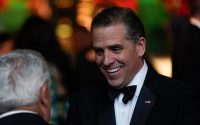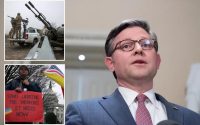Why Hunter Biden threatened his Chinese business associate
First son Hunter Biden angrily threatened a Chinese businessman over a deal in 2017, saying the associate would “regret not following” his direction and using his father, Joe Biden, as leverage.
Hunter told Harvest Fund Management chairman Henry Zhao that he was “sitting” with his dad and the two “would like to understand why the commitment made has not been fulfilled,” according to a July 30, 2017, WhatsApp message disclosed to Congress by IRS whistleblowers who were investigating the first son’s finances.
“Tell the director that I would like to resolve this now before it gets out of hand, and now means tonight,” Hunter told Zhao.
“And, Z, if I get a call or text from anyone involved in this other than you, Zhang or the chairman, I will make certain that between the man sitting next to me and every person he knows and my ability to forever hold a grudge that you will regret not following my direction.”
The Post has previously reported on Hunter’s extensive overseas business investments — in Russia, China, Romania and Ukraine — as many foreign nationals were drawn into the Biden family’s orbit.

Hunter and his associates raked in roughly $17.3 million between 2014 and 2019 from entities in Ukraine, Romania and China, $8.3 million of which went to the first son, IRS whistleblowers testified to the House Ways and Means Committee.
Here are the facts regarding Zhao’s relationship with Hunter:
Who was Hunter Biden threatening and why?
Hunter, now 53, was threatening Zhao, a Communist Party official, who has served as chairman of Harvest Fund Management since 2017, and as chairman of Harvest Global Investments Ltd. since 2000, according to Bloomberg.
Zhao in 2013 helped set up Hunter’s investment firm Bohai Harvest RST, known as BHR Partners, with the help of the China-based firms Harvest and Bohai Industrial Investment Fund, as well as Thornton Group LLC and the then-second son’s Rosemont Seneca Partners. Each private equity firm held a 30% share of BHR.
The fund formed 12 days after Hunter had joined then-Vice President Biden aboard Air Force Two for a state visit to Beijing.

According to IRS supervisory agent Gary Shapley, Zhao was also an executive with CEFC China Energy at the time and apparently helped Hunter and his associates — including first brother James Biden — further their business with the Chinese energy conglomerate.
The exchange implies that Hunter was concerned he would be shut out of a lucrative opportunity with CEFC chairman Ye Jianming, in which according to Shapley millions of dollars were at stake.
CEFC was at the forefront of Chinese President Xi Jinping’s Belt and Road Initiative, and Ye Jianming earned the nickname “Belt and Road billionaire” for his success.


The IRS investigator testified that Hunter in another message vowed to “put this to bed tonight … I can make $5 [million] in salary at any law firm in America.”
“If you think this is about money it’s not,” Hunter reportedly said. “The Bidens are the best I know at doing exactly what the chairman wants from this partnership … let’s not quibble over peanuts.”
What was the Chinese deal all about?
While he had partnered with Zhao in a separate $5 million deal, Hunter sought further funds through a deal with CEFC.
In a May 2017 email from Hunter’s laptop, the China venture would include a percentage stake of “10 held by H for the big guy,” who was identified by his associates James Gilliar and Tony Bobulinski as Joe Biden. Biden family friend Rob Walker was also in on the action.
The associates reportedly chose the investment because, as Bobulinski said, CEFC had “more money than God.”

Ten days after the messages to Zhao in July, the deal went through in a series of payments made to Hunter’s law firm, according to a Senate Republican report.
On Aug. 4, 2017, CEFC Infrastructure Investment paid Owasco P.C. $100,000.375, which was immediately flagged as potential criminal financial activity.
$5 million was subsequently wired from the CEFC subsidiary to Owasco on Aug. 8, 2017, which was later transferred to Hudson West III LLC, where Hunter was later listed as a co-owner.
The Senate report and the Washington Post independently confirmed that $4.8 million from the deal eventually made its way to the first son’s Owasco account.

Who was the “chairman” Hunter mentioned and how did he give the first son a diamond?
Hunter’s references to the chairman point to CEFC’s Ye Jianming, whom Zhao said was “willing to cooperate with the [Biden] family” on the Chinese deal, according to Shapley’s testimony.
“He’s basically saying have the director call him, and he’s demanding that he doesn’t call James Biden or Tony [Bobulinski] or Jim Bulger,” Shapley said, referring to business associates of Hunter.
Jianming and CEFC Executive Director Jianjun Zang, also known as “Director Zang,” had first met Hunter in December 2015, according to schedules on his laptop.

In February 2017, Jianming had hosted Hunter at a private dinner in expectation of their partnership, promising him $10 million annually for at least three years with a return promise of making “introductions alone,” according to another laptop email.
As a token of his goodwill, the CEFC director later gifted Hunter a 3.16-carat diamond worth $80,000.
Christopher Clark, an attorney for the first son, said in a statement Friday that the IRS whistleblowers testimony was “[b]iased and politically motivated” and that the scope of the Justice Department’s investigation into his client’s conduct “covered a period which was a time of turmoil and addiction for my client.”
“Biased and politically motivated, selective leaks have plagued this matter for years. They are not only irresponsible, they are illegal. A close examination of the document released publicly yesterday by a very biased individual raises serious questions over whether it is what he claims it to be,” Clark said.
“It is dangerously misleading to make any conclusions or inferences based on this document.”
“Any verifiable words or actions of my client in the midst of a horrible addiction are solely his own and have no connection to anyone in his family,” he added.
“An extensive, five-year-long investigation conducted by the United States Department of Justice (DOJ) concluded this week, which resulted in my client taking responsibility for two instances of misdemeanor failure to file tax payments, as well as a firearm charge, which will be subject to a pretrial diversion agreement. As his attorney through this entire matter, I can say that any suggestion the investigation was not thorough, or cut corners, or cut my client any slack, is preposterous and deeply irresponsible,” Clark concluded.


